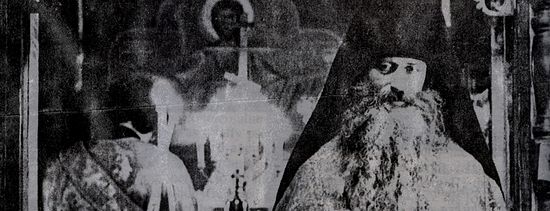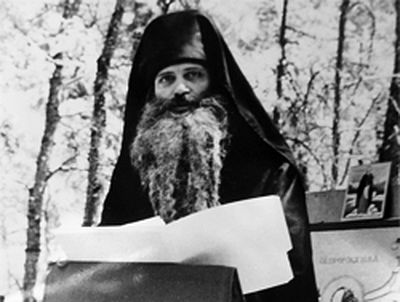The present age is, in a profound sense, an age of absurdity. Poets and dramatists, painters and sculptors proclaim and depict the world as a disjointed chaos, and man as a dehumanized fragment of that chaos. Politics, whether of the right, the left, or the center, can no longer be viewed as anything but an expedient whereby universal disorder is given, for the moment, a faint semblance of order; pacifists and militant crusaders are united in an absurd faith in the feeble powers of man to remedy an intolerable situation by means which can only make it worse. Philosophers and other supposedly responsible men in governmental, academic, and ecclesiastical circles, when they do not retreat behind the impersonal and irresponsible facade of specialization or bureaucracy,usually do no more than rationalize the incoherent state of contemporary man and his world, and counsel a futile “commitment” to a discredited humanist optimism, to a hopeless stoicism, to blind experimentation and irrationalism, or to “commitment” itself, a suicidal faith in “faith”.
But art, politics, and philosophy today are only reflections of life, and if they have become absurd it is because, in large measure, life has become so. The most striking example of absurdity in life in recent times was, of course, Hitler’s “new order”, wherein a supposedly normal, civilized man could be atone and the same time an accomplished and moving interpreter of Bach (as was Himmler) and a skilled murderer of millions, or who might arrange a tour of an extermination camp to coincide with a concert series or an exhibition of art. Hitler himself, indeed, was the absurd man par excellence, passing from nothingness to world rule and back to nothingness in the space of a dozen years, leaving as his monument nothing but a shattered world, owing his meaningless success to the fact that he, the emptiest of men, personified the emptiness of the men of his time.
Hitler’s surrealist world is now a thing of the past; but the world has by no means passed out of the age of absurdity, but rather into a more advanced-though temporarily quieter-stage of the same disease. Men have invented a weapon to express, better than Hitler’s gospel of destruction, their own incoherence and nihilism; and in its shadow men stand paralyzed, between the extremes of an external power and an internal powerlessness equally without precedent. At the same time, the poor and “underprivileged” of the world have awakened to conscious life, and seek abundance and privilege; those who already possess them waste their lives in the pursuit of vain things, or become disillusioned and die of boredom and despair, or commit senseless crimes. The whole world, it almost seems, is divided into those who lead meaningless, futile lives without being aware of it, and those who, being aware of it, are driven to madness and suicide. […]
So it is too with absurdism; it is the negative side of a positive reality. There is, of course, an element of incoherence in our world, for in his fall from Paradise man brought the world with him; the philosophy of the absurd is not, therefore, founded upon a total lie, but upon a deceptive half-truth. But when Camus defines absurdity as the confrontation of man’s need for reason with the irrationality of the world, when he believes that man is an innocent victim and the world the guilty party, he, like all absurdists, has magnified a very partial insight into a totally distorted view of things; and in his blindness has arrived at the exact inversion of the truth. Absurdism, in the’end, is an internal and not an external question; it is not the world that is irrational and incoherent, but man.
If, however, the absurdist is responsible for not seeing things as they are, and not even wishing to see things as they are, the Christian is yet more responsible for failing to give the example of a fully coherent life, a life in Christ. Christian compromise in thought and word and negligence in deed have opened the way to the triumph of the forces of the absurd, of Satan, of Antichrist. The present age of absurdity is the just reward of Christians who have failed to be Christians.
And the only remedy for absurdism lies at this, its source: we must again be Christians. Camus was quite right when he said, “We must choose between miracles and the absurd.” For in this respect Christianity and absurd ism are equally opposed to Enlightenment rationalism and humanism, to the view that reality can be reduced to purely rational and human terms. We must indeed choose between the miraculous, the Christian view of things, whose center is God and whose end is the eternal Kingdom of Heaven, and the absurd, the Satanic view of things, whose center is the fallen self and whose end is Hell, in this life and in the life to come.’
We must again be Christians. It is futile, in fact it is precisely absurd, to speak of reforming society, of changing the path of history, of emerging into an age beyond absurdity, if we have not Christ in our hearts; and if we do have Christ in our hearts, nothing else matters.
It is of course possible that there may be an age beyond absurdity; it is more likely, perhaps-and Christians must always be prepared for this eventuality-that there will not be, and that the age of absurdity is indeed the last age. It may be that the final testimony Christians may be able to give in this age will be the ultimate testimony, the blood of their martyrdom.
But this is cause for rejoicing and not for despair. For the hope of Christians is not in this world or in any of its kingdoms-that hope, indeed, is the ultimate absurdity; the hope of Christians is in the Kingdom of God which is not of this world.




